初中英语不定代词的用法复习课程
初中英语不定代词精讲课件

5. I can’t understandmuch _______of his speaking
much 6. I like milk, so I drink ______every day. 7.John want to join the music club very much _____.
总结every,each的用法
either
Either
.总结both和all 的用法
1.both “两者都 “ all “三者都“
2. both+名词复数 both of 代词宾格复数 both of + the+名词复数 3. all + the+ 名词复数 all of +代词宾格复数
不可数名词 all of + the+名词复数 4. all 和 both 也可作副词,放在系动词后,行为动词前 例如: The twins both work hard. The four girls are all kind.
习惯搭配: one ….the other some …..others …….
六. 用another和other、others
others 1 Lei Feng is always ready to help ________.
2 Some are planting trees, some are carrying water, others are watering the trees . and _________ 3.I have got ten pencils. Two of them are red , the others are blue. _______ 4 She held a pen in one hand and his notebook in the ________. other others another 5 I have read three stories. I’ll go on to read _____.
不定代词讲解(初中英语语法)讲课教案
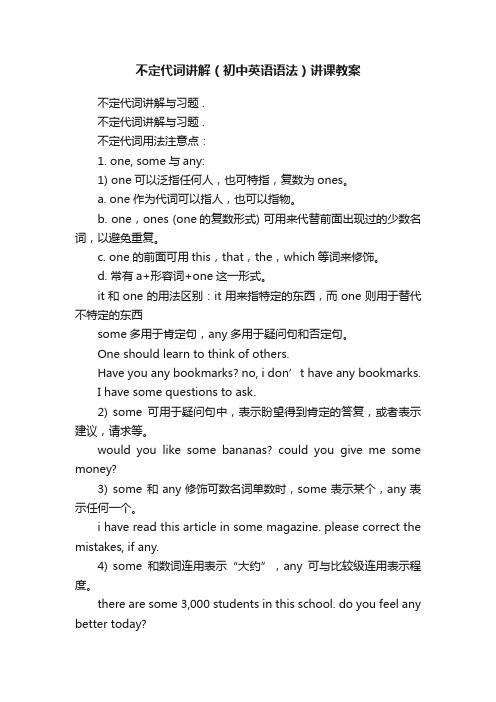
不定代词讲解(初中英语语法)讲课教案不定代词讲解与习题 .不定代词讲解与习题 .不定代词用法注意点:1. one, some与any:1) one可以泛指任何人,也可特指,复数为ones。
a. one作为代词可以指人,也可以指物。
b. one,ones (one的复数形式) 可用来代替前面出现过的少数名词,以避免重复。
c. one的前面可用this,that,the,which等词来修饰。
d. 常有a+形容词+one这一形式。
it和one的用法区别:it用来指特定的东西,而one则用于替代不特定的东西some多用于肯定句,any多用于疑问句和否定句。
One should learn to think of others.Have you any bookmarks? no, i don’t have any bookmarks.I have some questions to ask.2) some可用于疑问句中,表示盼望得到肯定的答复,或者表示建议,请求等。
would you like some bananas? could you give me some money?3) some 和any修饰可数名词单数时,some表示某个,any表示任何一个。
i have read this article in some magazine. please correct the mistakes, if any.4) some和数词连用表示“大约”,any可与比较级连用表示程度。
there are some 3,000 students in this school. do you feel any better today?2. each和every:a. each用来指两个或两个以上的人或物中的一个。
every则指两个以上的人或物中的一个。
b. 从含义和语法功能上看,each是“单个”的意思,侧重个体,在句中可作主语、同位语、定语和宾语。
不定代词的用法课件
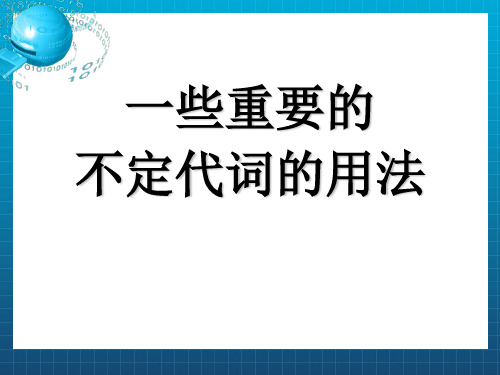
There were few eggs is the fridge, so he went to the sup ermarket and bought some. 冰箱里几乎没鸡蛋了,所以他去超 市买了一些。 3. few 作主语时,谓语动词仍用复数,例如:
每一个
≥2
单数
单数
every
每一个
≥3
单数
单数
both, either, neither
both为“两者都”,neither为“两者都不”,either为“两 者之一”。这三个单词都用于指两个人或物,在句中可作主语、宾 语和定语。 作主语: 1) Both (of them) enjoy the rice. 他们两人喜欢吃米饭。 2) Neither (of us) is a doctor. 我们俩都不是医生。 3) Either (of you) will go. 随你们哪个去都可以。
注意:作主语时,both后面的谓语动词用复数。neither, eit her后面的谓语动词一般用单数形式。 作定语: 1) Both Zhang Hua's father and mother worker work in a hos pital, but neither one is a doctor. 张华的父母亲在一所医院 工作,但都不是医生。
many / much
不定代词 both either
neither all
none
含义
两者都 两者中的任何
一个
两者都不
三者或三者以 上都
三者或三者以 上都不
数量 关系 =2 =2 =2 ≥3
中考英语不定代词课件(共29张PPT)
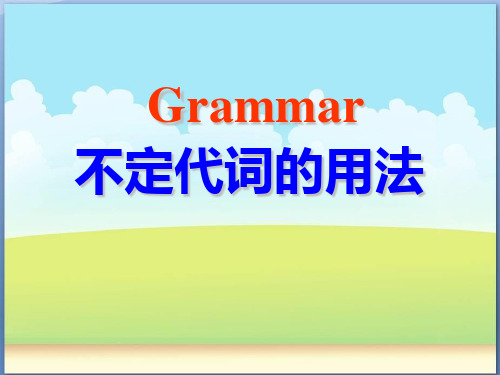
both…and… 作主语时,谓语动词用复数形式. either …or… “不是……就是; 或者……或者”. neither…nor… “既不…又不…
连接的并列结构作主语时, 谓语坚持就近原则
Both Li Ping and I _a_re__ (be) students. Neither Li Ping nor I _a_m__ (be) a student. Either this answer or that answer _i_s__ (be) correct.
There’s only __a_l_itt_le___ meat in the fridge. Please go and buy some.
Just _a_f_e_w__ students came to the party. Most of them stayed at home and watched TV.
3. some of +代词宾格复数 + the + 名词复数
I know some of them, but not all.
4. no+可数名词/不可数名词
no=not a/not any
I have no car. ( I don’t have a car.) We had no bread for breakfast. (We had not any bread for breakfast.)
A. few
B. a few
C. little
D. a little
2. There is little water in the bottle, __is_ _th_e_r_e___? (补全反意疑问句)
.复合不定代词
初三-不定代词的用法总结-修正版PPT课件

none 没有一个 one other 其它的
.
3
(2)普通不定代词的用法
★ some与any
• 一般说来,some 用于肯定句中,any 用于否定句、疑问句和条件句中。如: • ①肯定句:He asked some questions. 他问了一些问题。 • ②否定句:He didn’t ask any questions. 他没有问任何问题。 • ③疑问句:Did he ask any questions? 他问了些问题没有? • 但是,在表示请求、邀请或征求意见的句子中,希望对方的肯定回答,通常要用 some 而
• There is only a little milk in the glass. • He has few friends. • They had little money with them. • 2)a little和little也可以用作副词,a little表示“有点,稍微”,
little表示“很少”。 • I'm a little hungry. (修饰形容词hungry) • Let him sleep a little. (修饰动词sleep) • Mary, go a little faster, please. (修饰副词比较级) • She slept very little last night.
.
4
• ★ many与much
• 两者意思相同,都表示“许多”,但用法不同,many用于修饰或代替可数名 词;而much用于修饰或代替不可数名词。如:
• ① Many trees fell in the storm. 在暴风雨中许多树倒了。 • ② Much money has been wasted that way. 很多钱都这样浪费了。
最新初中英语语法 不定代词 讲义复习课程
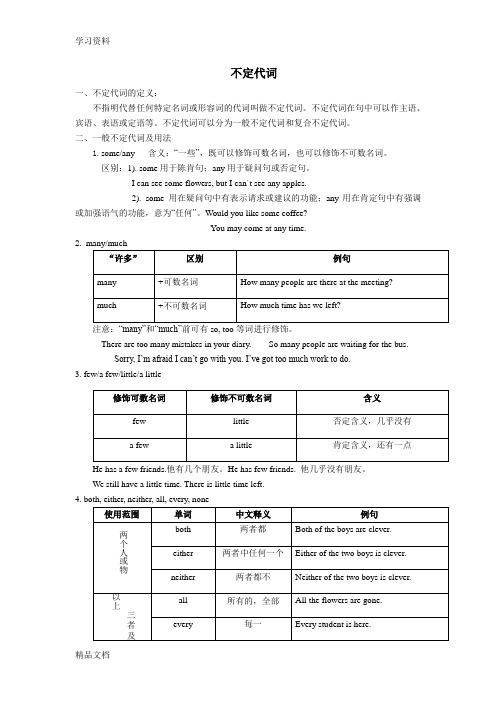
不定代词一、不定代词的定义:不指明代替任何特定名词或形容词的代词叫做不定代词。
不定代词在句中可以作主语、宾语、表语或定语等。
不定代词可以分为一般不定代词和复合不定代词。
二、一般不定代词及用法1. some/any 含义:“一些”,既可以修饰可数名词,也可以修饰不可数名词。
区别:1). some用于陈肯句;any用于疑问句或否定句。
I can see some flowers, but I can`t see any apples.2). some 用在疑问句中有表示请求或建议的功能;any用在肯定句中有强调或加强语气的功能,意为“任何”。
Would you like some coffee?You may come at any time.2. many/much注意:“many”和“much”前可有so, too等词进行修饰。
There are too many mistakes in your diary. So many people are waiting for the bus.Sorry, I’m afraid I can’t go with you. I’ve got too much work to do.3. few/a few/little/a littleHe has a few friends.他有几个朋友。
He has few friends. 他几乎没有朋友。
We still have a little time. There is little time left.4. both, either, neither, all, every, none5. “other” 、“another”、“others”和“the others”I have two pencils. One is yellow, the other is red.I don’t like this green pencil, please give me another one.In our class, some students like playing football, others like playing basketball.There are seven people in Running Man. One is a woman, and the others are men.三、复合不定代词及用法1. 复合不定代词的构成:复合不定代词是由some-,any-,no-,every-加上-one,-body,-thing 所组成的不定代词。
不定代词用法详解ppt课件

• Only a few people can solve this problem. 只有几个人能解决这个问题。
• Few of them want to go. 他们中几乎没有人想去。
• A few of them want to go. 他们中有几个人想去。
• (2) little“没有多少”,a little“少量”,修饰不可数名词;a little表示肯定意义, little表示否定意义。
9
• 4) everyone, everybody(每个人)和 everything(每样东西,一切事物)。 • She said good-bye to everyone. 她和每个人告别。 • Everybody's business is nobody's business. 事关大家无人管。 • Everything is ready for the experiment. 实验的一切都准备好了。 • This news means everything to us. 这个消息对我们至关重要。
7
• (5) the others表示同类中余下的全部。 • The search party was divided into two groups. Some went to the right, the
others went to the left. 搜寻小组一分为二,一部分人向右,另一部分向左。 • Jenny is cleverer than any of. the others in her class. 珍妮比班上的其他(任何)人
不定代词用法详解
1
• 1. some,any • (1) some多用于肯定句,修饰复数可数名词和不可数名词,作“一些”解。它还可修饰
不定代词知识点详解及练习(初中英语专题复习)
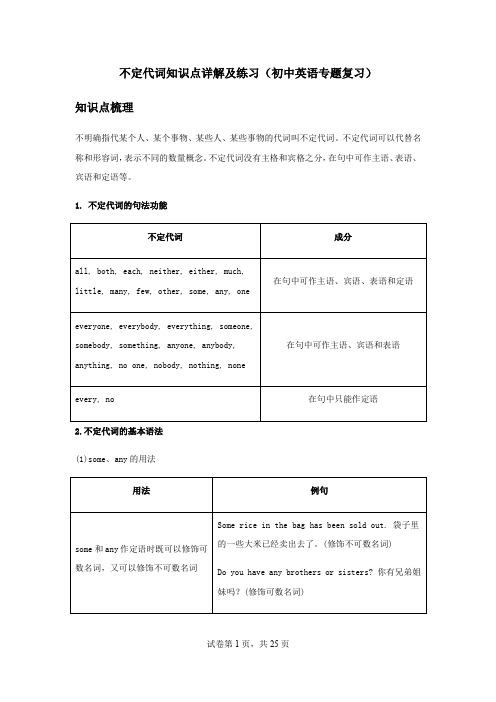
Not all books are good.(= All books are not good. 不是所有的书都是好书。
知识拓展:all作主语,指代人时,谓语动词使用复数形式,指代事情时,谓语动词一般使用单数;作同位语时,all在句中的位置与both相同。
(5)复合不定代词的用法
由some,any,every,no与one,body,thing一起构成的代词叫复合不定代词,如something,everybody,anyone,nothing等。由one和body构成的复合不定代词可相互换用。
用法
例句
复合不定代词一般用作单数,在句中作主语、宾语或表语
If you have any questions, please ask me. 如果你有问题,可以问我。
Any child needs love. 任何一个孩子都需要爱。
some和any可以用来修饰单数名词,some表示"某一";any表示"任何的"
Any student can answer this question. 任何学生都可以回答这个问题
some多用于肯定句;在表示请求、劝告、邀请、或不希望对方拒绝的疑问句中用some而不用any
Some of the boys are good at swimming. 一些男孩擅长游泳。
Will you give me some water? 请给我一些水好吗?
any多用于疑问句、否定句和条件状语从句中;用于肯定句中,表示"任何"
little不多,没有什么
知识拓展:
- 1、下载文档前请自行甄别文档内容的完整性,平台不提供额外的编辑、内容补充、找答案等附加服务。
- 2、"仅部分预览"的文档,不可在线预览部分如存在完整性等问题,可反馈申请退款(可完整预览的文档不适用该条件!)。
- 3、如文档侵犯您的权益,请联系客服反馈,我们会尽快为您处理(人工客服工作时间:9:00-18:30)。
复合不定代词精讲及考点解析复合不定代词的构成:复合不定代词是由some, any, no, every加-body,-thing,-one构成,列表如下:Somebody 某人Someone 某人Something 某物,某事 Anybody 任何人Anyone 任何人Anything 任何事物Nobody 没有人No one 没有人Nothing 没有东西 Everybody 每人Everyone 每人Everything 一切一:复合不定代词和部分否定部分否定是考试中的热门考点,常表达的结构有两种:1:not+全部肯定词2:助动词+not+全部肯定词。
其意都为“并非都,不都”1.I agree with most of what you said, but I don’t agree with ______.A. everything B: anything C. something D. nothing2.----The exam was difficult, wasn’t it?----No, but I don’t think ______ could pass it.A. somebodyB. anybodyC. nobody D everybody二:复合不定代词的定语位置复合不定代词被定语修饰的时候,定语必须放在不定代词后面。
特别是当修饰的定语比较复杂的情况下要认真分析,弄清词序间的修饰关系。
1.There is _____________ with your car.A. nothing seriously wrongB. seriously wrong nothingC. nothing wrong seriouslyD. wrong seriously nothing2.He asked me if there was _____________ to read.A. easy enough somethingB. enough easy somethingC. something easy enoughD. something enough easy三:复合不定代词与谓语的一致问题复合不定代词作主语时,谓语动词用单数。
Nothing except for a few books was left for him by his father.四.复合不定代词的用法区别1.大家都知道,带some的复合不定代词一般用于肯定句;而带any的复合不定代词常用在否定句,但是,带some 的复合不定代词也可以用在表示说话人希望得到肯定回答或表示请求,建议,询问的疑问句中。
如:Would you like ______ to eat?A. something B anything C. everything D nothing2. 带any的复合不定代词用在肯定句中带有“任何人,任何事”的意思。
Anyone who breaks the law will be thrown into prison.As a teacher, I would do anything for my students.特别要注意的是带any的复合不盯代词不能再用否定式。
如:Anything could not be seen in that dark room. (F)要表达否定意思,只可以用对应的全部否定的词代替。
如:Nothing could be seen in that dark room.3. 指人的复合不定代词合写与分开写,其意思和用法不同,以any为例。
anyone 仅指人任何人,某人,不和of连用any one 即指人,也指物,任何一个的意思可以于of连用Anyone can do the job.Any one of us can do the job.4. 一般情况下,用nothing 回答以what 开头的问题,nobody (no one) 回答who 开头的问题,none回答以how many开头的问题。
What’s on the table? ----- Nothing.Who is in the classroom?-------- Nobody. ( No one).How many people are there in the room?————None.同步专练1. “I don’t think I am different from ____ else. I am just the son of a farmer,”Mo Yan said.A. anyoneB. nobodyC. someoneD. everyone2. There is ____ wrong with your watch. Look! It works well.A. somethingB. nothingC. everythingD. anything3. —Good morning, class. Is ____ here? —No, sir. Tom is absent(缺席).A. anyoneB. everyoneC. no oneD. someone4. Everything ____ready.A. areB. isC. beD. were5. Did you meet ____ in the street?A. a very tall someoneB. very tall anyoneC. someone very tallD. anyone very tall6. —How was the school trip yesterday?—Great. ____ had a good time.A. EveryoneB. No oneC. SomeoneD. Anyone7. —Tom, supper is ready.—I don’t want to eat ____, Mum. I’m not feeling well.A. everythingB. nothingC. somethingD. anything8. ____ is waiting for you at the gate. He wants to say thanks to you.A. SomebodyB. AnybodyC. EverybodyD. Nobody9.—What do you think of these two books?—______ of them are interesting. And I’ve read them several times.A. BothB. NeitherC. NoneD. Either10—Does your English teacher chat with you on QQ?—Yes, sometimes. It’s _______ we enjoy doing at weekends.A.anythingB. somethingC. everythingD. Nothing11 My family has two dogs. One is white, ________ is black.A.otherB. anotherC. the otherD. Others12—All the volunteers were very tired, but ______ of them took a rest.—They were busy looking for the missing people.A.neitherB. allC. bothD. None13 —Look! There are lots of old people in the park.—They look relaxed. Some are playing the card , ___________ are chatting.A. anotherB. the otherC. otherD. Others14 —Would you like tea or coffee?—_____________is OK. I’d like water.A.BothB. NeitherC. EitherD. All15 --Which basketball player do you like best, Kobe, James or Jordan?--- ______of them. Lin Shuhao is my favourite.A.AllB. NoneC. EitherD. Neither16 When shall we go to West Slender Lake, this afternoon or tomorrow morning?______ is OK. I’m free these days.A. BothB. AllC. EitherD. Neither17.______ can make my mother change her mind. She is such a person who never gives upeasily.A. SomethingB. AnythingC. NothingD. Everything.18--- What can I do for you, sir?--- It’s so hot now. Could you give me _____________.A. cold something to eatB. anything cold to drinkC. anything cold to eatD. something cold to drink19.---Tom, supper is ready.----I don't want to eat____________ ,Mum. I'm not feeling well.A. everythingB. nothingC. somethingD. anything20 —Which would you like , tea or coffee?—_______ is OK, I don’t mind.A. BothB. NeitherC. EitherD. Every21.-Which do you prefer, a CD player or a walkman?-______. I prefer a portable computer.A. BothB. EitherC. NoneD. Neither22 Walking along the streets,you can see many beautiful flowers on _____ side of the street.A. everyB. allC. bothD. either。
